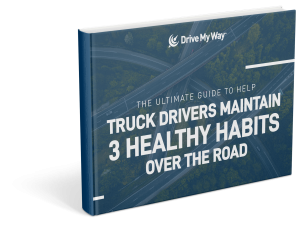
Truck drivers spend a significant time away from home. They might not have much quality time with family and friends for long stretches of time. Truckers might spend most of their day without actually talking to anyone face-to-face. Compound this with an extremely high-stress job, and it’s probably not too difficult for a trucker to develop some feelings of loneliness and anxiety. If those feelings don’t get addressed properly, true depression can soon follow. Here are 3 ways to overcome truck driver depression.
What is Depression?
Almost everyone has days when they’re just not feeling 100% happy. Or maybe a mild stretch of feeling sad over something. But actual depression is different. It’s when these feeling last more than a few weeks. And the symptoms cause physical changes to a person’s everyday life. Symptoms can range from mild things like loss of sleep, mood swings, or lack of energy. Sometimes symptoms can be more severe, and result in someone not able to get out of bed or leave their house for days. Truck driver depression rates are almost 2 times that of the general population..
More than 17 million U.S. adults—over 7% of the population—had at least one major depressive episode in the past year. – National Alliance on Mental Illness
Tip 1: Recognize and React
Be receptive to your own thoughts and feelings. Also be accepting of others asking you if you’re doing ok. Once you’re aware that there’s an issue, you can work to make changes to help address it. Truck drivers usually have time in the evenings to do their research. Take that alone time and flip it from a negative to a positive. Listen to a good mental health podcast. Start to put together plans to begin to feel better, and stay ahead of things should symptoms arise again the future.
Tip 2: Don’t Make Things Worse
Rather than dealing with any type of problem, some people think that things will just get better or try to fix it themselves. Or some people prefer to not seek help when they don’t feel great, and just hope things go away. With depression, it’s not always just that easy. Thinking this way often leads people to try and mask systems by abusing alcohol or drugs. Or taking out anger and frustrations on friends or loved ones. Truck drivers already have a high rate of drug/alcohol abuse. Seek help as soon as you recognize symptoms. This is something that’s not just going to go away on it’s own if left untreated.
Tip 3: Plan to Stay Healthy
Once truck driver depression is being treated, it’s time to start planning ahead to make sure they stay healthy. There’s plenty of resources out there that help find ways to reduce stress. There’s plenty of ways to stay in touch with your family and friends while away from home. And lastly, there’s plenty of ways to keep your mind and body in shape with a good diet and plenty of exercise out on the road.
Changing Times
The stigma associated with mental disorders and illness continue to decrease. People with depression issues no longer need to hide in the shadows alone. There are more support organizations and resources available than there ever have been. Some trucking companies even offer mental health benefits and resources specifically to their drivers. Truck driver depression is something that can be identified, treated and overcome when the driver connects with the right resources.
If you or someone you know are struggling with depression, and need someone to talk to, please seek help. If you can’t get in touch with your doctor. a great place to seek help is through the National Alliance on Mental Illness. The NAMI HelpLine can be reached Monday through Friday, 10 am–6 pm, ET. 1-800-950-NAMI (6264) or info@nami.org.
The Ultimate Guide for Truck Drivers to Maintain 3 Healthy Habits Over the Road
Download the complete guide for tips to easily maintain healthy habits over the road.



 That was two years ago. Borzyskowski has battled
That was two years ago. Borzyskowski has battled  Recently Borzyskowski even stopped to check on another driver who drove into a ditch.
Recently Borzyskowski even stopped to check on another driver who drove into a ditch.
 Brian Sparks wanted out in the worst possible way.
Brian Sparks wanted out in the worst possible way. Samantha Rohweder, an expedited dry van team driver, also says driving empowered her to overcome her depression.
Samantha Rohweder, an expedited dry van team driver, also says driving empowered her to overcome her depression.
